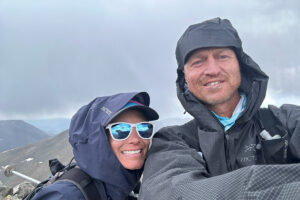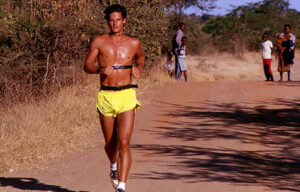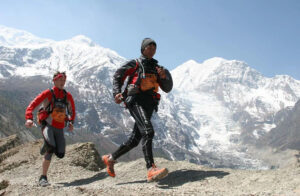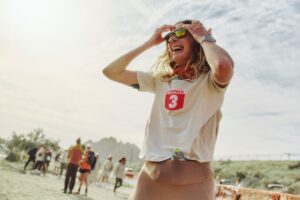Many consider Abdellatief Abou Heif the greatest long-distance swimmer ever. In Egypt, he was a national hero. Streets and buildings bore his name. In 1991, the International Swimming Hall of Fame voted him the Marathon Swimmer of the Century. Yet many outside Egypt or the world of open-water swimming have never heard of him.
Born in 1929, Abou Heif was one of 15 children. All of them liked sports, but he was the only swimmer. Everyone else played ping pong. His desire to swim came from the 1932 film, Tarzan the Ape Man. He loved the actor playing Tarzan, Johnny Weissmuller. In the 1920s, Weissmuller had won five Olympic medals swimming. That was all Abou Heif needed for inspiration.
His success in the water started at an early age. He won his first races in Alexandria, the city he was born in, at the age of nine. Abou Heif then went to school in the UK, first at Eton College and then at Sandhurst Military Academy. He returned to Egypt to serve in the army and eventually became a colonel. He continued swimming throughout.

Photo: Toronto Public Library
First swims
His first famous win came in 1953, in a 29km race on the river Seine in France. Two years later, already the world’s top marathon swimmer, he was invited to take part in a race across the English Channel. He had already swum the Channel twice but never in a race.
Swimming was the national sport in Egypt, and Egyptian swimmers had won all but one of the Channel races since they began in 1950. This was a time when marathon swims had substantial prize money. For the 1955 race, it was £1000 – enough to buy a house at the time. It drew in the best swimmers in the world. All eyes were on Abou Heif.
The starting conditions in France were good but worsened as the race continued. For 12 hours, Abou Heif and Tom Park, the American open-water champion, swam neck and neck. Then with a few kilometers to go. Abou Heif pulled away and won by 17 minutes. Only three people managed to finish the race.
He donated his winnings to the family of a swimmer who had died trying to make the crossing. He wanted to return in 1956, but when Egypt nationalized the Suez Canal, all Egyptians were banned from entering the race. Tom Parks won that year. By the time Abou Heif was allowed to re-enter, the race had come to an end.
Three-time overall champion
Between his 1953 river Seine swim and 1972, he took part in 68 international races, all between 30 and 80km. He won many of them and placed less than third in just 12 races.
A circuit of swims took place in Canada, the U.S., Italy, and South America. Swimmers received points for every race, like Formula I drivers, and the one with the most points at the end of the circuit was the overall champion. Abou Heif earned that distinction in 1964, 1965, and 1968.
A few of Abou Heif’s swims were particularly striking. In 1963, he raced 96.5km across Lake Michigan. It was the longest open water race ever held. Professional marathon swimmers didn’t wear wetsuits. Unlike triathletes, they still don’t. Resisting cold was considered part of the challenge. So many of the swimmers’ body types were closer to walruses than whippets.
Abou Heif battled strong waves and currents, and a water temperature of 11˚C. He was up against Ted Erikson. Erikson was a formidable rival. He had become the first to cross Lake Michigan two years earlier and was also a member of the International Marathon Swimming Hall of Fame.
It was a two-man race but Abou Heif won in a time of 34 hours and 38 minutes. Erikson finished in 37 hours and 31 minutes.

Photo: Toronto Public Library
Swam a two-man relay by himself and won
Two years later, he swim in a relay race in Montreal with partner Giulio Travaglio of Italy. They were supposed to alternate every hour, but Travaglio had to pull out after the first hour because of illness. So Abou Heif swam the whole race himself and won. It took him 30 hours, and every other relay team pulled out. The race was so difficult that it was never staged again.
This was not the first or last time Abou Heif outlasted everyone else. Where others pulled out because of the weather or water temperature, the Nile Crocodile, as he was known, battled on. No patch of water seemed too challenging for him. At the end of every race, while others struggled to finish, he would sprint to the finish line.
Despite his prowess, his physique did not suggest such a formidable athlete. He stood five foot and ten inches and weighed between 200 and 260 pounds.
A trencherman appetite
Most athletes stuck to a regimented diet and race-day eating plan. Abou Heif was different. He had a rough plan but ate by instinct. Often he showed up about four hours before a race and polished off a huge meal of two whole chickens, milk, and orange juice. Occasionally he sat down to eat but stopped after a few mouthfuls. If he was not hungry, he wouldn’t force himself.
Similarly, during the race, he swam to his own tune. Everyone else drank liquid-based top-ups. Not Abou Heif. In his book Wind, Waves and Sunburn, Conrad Wennerberg recalls how during the La Tuque 24 Hour Swim (a two-man, 24-hour relay in chilly northern Quebec) he sent out for solid food. Abou Heif jumped out of the water and scarfed down two burgers, three fried eggs, and six glasses of orange soda. Ten minutes later he was swimming again at full speed.
“It would kill other swimmers…Abou Heif is the only swimmer who can do such a thing,” wrote Wennerberg.

Photo: egypttoday.com
In 1975, Abou Heif retired from racing. He continued to be revered until his death in 2008.
“If an emblem were made that represents Abou Heif and his feats, it would have a big set of beautiful white teeth amid a friendly grin and a picture of a huge stomach,” writes the International Swimming Hall of Fame.






